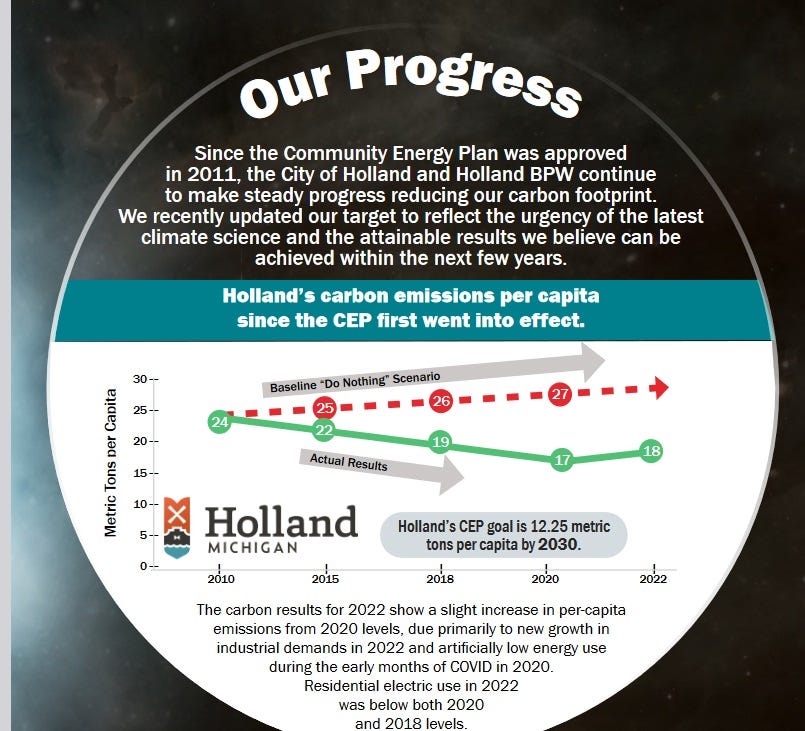In 2022 the City of Grand Haven formed the Sustainability and Energy Commission (SEC) that has a stated mission of assisting “the City of Grand Haven - as well as its business community, local institutions, residents, and visitors - with the conservation and restoration of natural resources and sensitive habitats, reduction of waste, and support community driven clean energy solutions while fostering responsible growth.”
The SEC has hosted city beach cleaning events, been involved with Earth Day celebrations, and regularly discusses actions that can be taken such as conducting studies and proposing policy and ordinance changes to reduce Grand Haven’s impact on the environment. Examples of some ideas that have been discussed include:
working with the city planner to implement zoning ordinances that protect trees on residential and private property
recommending strategies for, and implementing water reduction standards
creating sustainability ordinances for new construction and incorporating them into the city’s master plan
creating a community energy plan which proposes ways the city can reduce its greenhouse gas emissions and become less reliant on coal by increasing its reliance on renewable energy sources
Despite striving to be community driven, the SEC Steering Committee contains regional representatives from local government and the board of light and power (BLP), as wells as community members and leaders. The SEC is broken down into committees: Fire Team, Earth Team, Wind Team, and Water Team. These committees are given specific tasks and report to the SEC. The SEC was previously known as the Environment and Natural Resources committee (ENRC). The ENRC cancelled all scheduled monthly meetings from January 2022 to July 7, 2022. The first SEC meeting was held July 27, 2022.
In 2022, congress passed the Inflation Reduction Act which provided nearly $369 billion for renewable energy equipment and energy efficient home improvements. This is only one example of government funding the SEC hopes will be awarded to Grand Haven based government entities, businesses, nonprofits, and residents. In May 2023, John Kinch, member of the SEC and Executive Director of Michigan Energy Options suggested the SEC “help businesses, municipalities and individuals navigate the rebates and tax breaks for electrifying the grid through the Inflation Reduction Act.”
In June 2023, the SEC had secured $100,000 in funding to support the development of a Community Energy Plan like the City of Holland developed in 2011. In August, Grand Haven Township considered a $15,000 contribution toward creating the Community Energy Plan, but ultimately contributed $11,000. Funding was received from the following entities.
City of Grand Haven - $25,000
City of Ferrysburg
Grand Haven Township - $11,000
Grand Haven Area Community Foundation - $25,000
Michigan Department of Environment, Great Lakes, and Energy (EGLE) - $25,000
Loutit Library Foundation - $17,500
The contract for developing a Community Energy Plan was awarded to Michigan Energy Options owned by John Kinch. Deliverables from the plan include a carbon footprint of the BLP service area and strategies for decarbonization.
Kinch, also a failed BLP board candidate, and active member of the SEC, hopes the creation of the plan will provide opportunities for his company and others to capture available funding opportunities such as grants and low interest loans. During the July 15, 2024, council meeting Kinch made several statements about securing available funding such as, (2:21:18) “There is a lot of outside funding available now-a-days for these kinds of projects, and one of the ways you get grant funding from the state or federal government, or other places, is that you have a cohesive plan that you plan to make improvements on.” Kinch also stated, (2:31:30) “There’s also outside funding available; grants, loans, those kinds of things that can help make your capital stack a lot less out of your own pocket, and out of somebody else’s.”
It appears the ultimate goal of the SEC is to influence the creation of local ordinances and government policies that will force residents and businesses to adhere to arbitrary standards based on science that the SEC thinks is solid. It is more likely that cost inefficient ordinances will be created that infringe on the rights of citizens while solving little as they enrich the government departments and stakeholders that participate in the sophisticated ruse. Grant money is not free money. That statement is worth repeating: grant money is not free money. It just comes from the taxpayers through different bureaucratic channels that remove the input of citizens.


